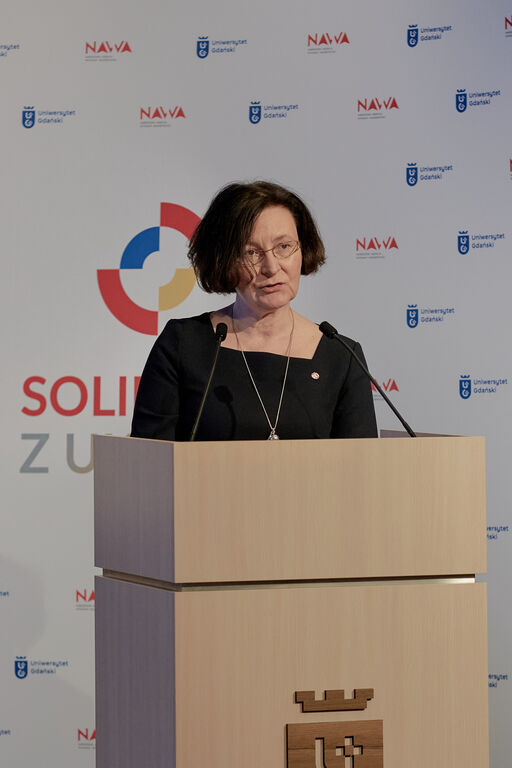Organized by the Polish National Agency for Academic Exchange and the University of Gdańsk, the conference "Solidarity with Ukraine. Students, scientists, institutions” turned out to be a success - both in terms of attendance and in terms of content. The representatives of the academic community discussing in Gdańsk presented not only the activities that had been carried out so far, but also ideas and predictions for the nearest future.
Below you will find a video summing up the two-day conference.
During the two-day session, which took place at the University of Gdańsk, various issues were discussed, including matters related to the recognition of education, cooperation with Ukrainian institutions and a topic of volunteering. There were examples of help that Polish universities provided to their Ukrainian counterparts. An example may be the University of Warsaw, which - as emphasized by Dr. Sławomir Żółtek, prof. of the Warsaw University – offered a space on its local servers for both - data storage and remote learning. The Polish Academy of Sciences awards scholarships that enable work in its institutes, but without the scientists resigning from Ukrainian affiliation. And it is agreed - as added prof. Jerzy Duszyński, president of the Polish Academy of Sciences - with the Ukrainian side, because local scientists are already afraid of the generation gap. The help of the Polish Academy of Sciences has enabled the creation of a small research group in which both sides - people from Ukraine, and from Poland - can work together. These will be mini-centers of excellence that will enable Ukrainian researchers - when the war is over - a quick return to Ukraine.

All these activities are aimed at ensuring that - as emphasized by prof. dr hab. Arkadiusz Mężyk, chairman of the Conference of Rectors of Academic Schools in Poland - maintain the possibility of building Ukrainian elites. An interesting example, according to the panellist, is the possibility of awarding double diplomas or online teaching with practical or laboratory part at Polish universities. The aim of Polish activities should not be brain drain, taking over students or scientists.
- We should be flexible and listen to the needs of the Ukrainian side and respond to them - said Dr. Grażyna Żebrowska, Director General of the Polish National Agency for Academic Exchange.

Of course, there were also Ukrainian voices. The panellists included, among others, Olesia Vashchuk, chairman of the Council of Young Scientists at the Ministry of Education and Science of Ukraine, Viktoriya Sergiyenko, director of the Information and Image Center in Kiev and Ukrainian Minister of Education and Science, Serhiy Shkarhet.
- Poland, as a good neighbour, has taken up the challenge brought about by this situation and has accepted the largest number of Ukrainians as refugees in the world. Today, about 2 million of my countrymen whom you have welcomed reside in your country. And for that I thank you today. I would also like to thank the National Agency for Academic Exchange for the program that will allow many people from Ukraine to continue their studies at Polish universities. This is important, especially since the aggressor still destroys civilian objects. 1,439 schools were destroyed and even more suffered. Only today we have survived three missile attacks - said Serhiy Shkarnet on the first day of the conference, May 12.
It is worth noting that the title of the conference was not accidental. The axis of the meeting was the "Solidarity with Ukraine" program, mentioned by Minister Serhiy Szkarhet, and prepared by NAWA as part of a government initiative. Its task is to ensure the continuity of education for students and doctoral students who appeared in Poland after February 24th as military refugees and who were prevented from studying or conducting research in their country. In the course of consultations, a program was developed aimed at universities supervised by the Ministry of Education and Science or the Ministry of Health, which wanted to enable students and doctoral students to continue their studies, prepare a doctoral dissertation or undergo other forms of education (language or preparatory courses) free of charge.
- We knew that we had to help not only the students and doctoral students who came to us, but also the universities that were burdened by this situation, because they wanted to give the possibility of continuing their education to students and doctoral students who came to Poland. Importantly, its assumptions were created very quickly and in close consultation with representatives of the academic community - explains Dr. Grażyna Żebrowska, Director General of NAWA.
Applications for funding were submitted by 98 institutions (universities and research institutes), and each of these institutions received funding. The amount of funds granted is over PLN 23.3 million (including entities supervised by the Ministry of Health - over PLN 4.28 million, and entities supervised by the Ministry of Education and Science - over PLN 19 million). On the basis of the university's declaration, this sum should allow for the education of approx. 2,000 students. people.
- First of all, it must be said that the Polish academic community once again passed a very difficult exam and proved that it understands its mission and responsibility, concludes Prof. dr hab. Włodzimierz Bernacki, deputy minister of education and science.












